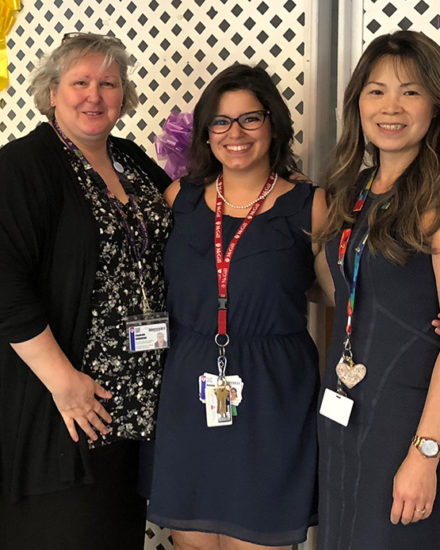Lachine nursing research poineer awarded

Chantal Bourdeau, clinical-administrative coordinator at the Lachine Hospital; Amélia Joucdar, clinical nurse specialist at the Lachine Hospital; and Virginia Lee, senior nursing research consultant (interim) at the MUHC.
Amélia Joucdar will receive $9,000 to get started on a project aimed at improving the quality of care and the experience of a hospital stay for elderly patients.
Last week, the Lachine Hospital celebrated the accomplishment of one of its nurses, Amélia Joucdar, a clinical nurse specialist specializing in geriatrics. She was awarded the MUHC Department of Nursing 2018 Small Grants Program’s scholarship for nursing research.
“Lachine has been part of the MUHC for 10 years, and this is the first time that we’ll be conducting nursing research here. It’s a really positive step,” says Chantal Bourdeau, the Lachine Hospital’s clinical-administrative coordinator. “I’m so thankful to Amélia for submitting her project and for putting us on the map when it comes to research.”
Under the mentorship of Andréa Laizner, MUHC nursing practice consultant for research, Amélia will receive $9,000 to get started on her project that looks at the recent successful implementation of the Approche adaptée à la personne âgée (AAPA) at Lachine. This initiative, requested by the Minister of Health and Social Services (MSSS), is aimed at improving the quality of care and the experience of a hospital stay for elderly patients and preventing their deconditioning.
“If the care we give is not specifically adapted for the geriatric client, there could be serious consequences, like decline in function or delirium,” explains Amélia.
Reproducing success and avoiding mistakes
The changes required to move ahead with the implementation of the AAPA at Lachine started in the summer of 2017. In just six months, the program was already closely integrated into the way care is provided.
“The implementation of AAPA has gone really well at Lachine!” says Amélia. “Everyone has signed on to the project 100 per cent: the nurses, patient attendants, nutritionists, occupational therapists, physiotherapists and doctors. And enthusiasm is still running high.”
In her research, Amélia will interview members of the multidisciplinary teams to get an in-depth understanding of the implementation of the AAPA at Lachine, and study the keys to its ongoing success.
“We need to take the time to analyze after the fact, asking ourselves how we were able to set up and maintain this project as easily as we did,” she explains. “And we also have to take a close look at what didn’t work: just because a project is implemented successfully doesn’t mean that everything went perfectly from A to Z.”
For Virginia Lee, senior nursing research consultant (interim), Amélia made a great choice in electing to study one of the MUHC’s priority projects.
“Her research has the potential to contribute significantly to the practice of nursing,” says Virginia. “Amélia will be one of the pioneers in nursing research at Lachine and could become a mentor for other nurses who will want to follow her example.”
The elderly and Quebec’s health system
The percentage of people aged 65 and over in Quebec will nearly double over the next 25 years, increasing from 14% to over 25%.
Currently, people over the age of 65 represent nearly 45% of all hospitalization days in Quebec, despite the fact that they make up only 14% of the population.
Source : CIUSSS de l’Ouest-de-l’Île-de-Montréal
The Nursing Research Small Grants Program
An initiative of the MUHC Department of Nursing, the Nursing Research Small Grants Program is intended to help MUHC nurses develop their research skills, encourage a climate of inquiry, and promote evidence-based practice at the MUHC. The program is funded by the Newton Foundation and the Montreal General Hospital Foundation.

